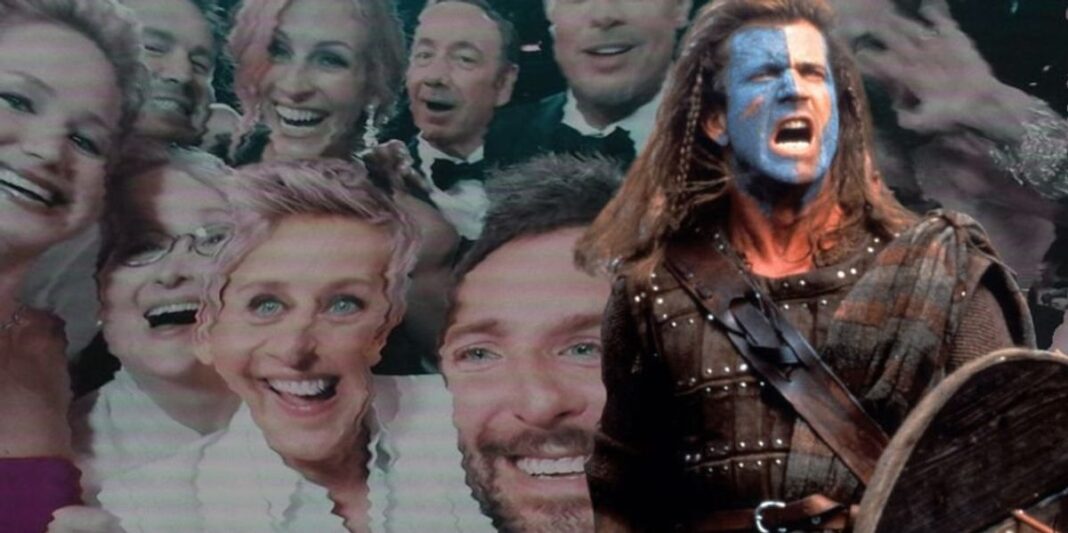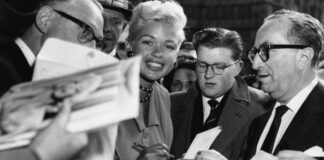Everyone knows who Mel Gibson is. He’s an absolute dynamo and a giant of the cinema industry. But if you ask me, he’s still deeply underrated, underestimated, and underappreciated.
Gibson’s always felt cut from a different cloth and a bit separated from the rest of Hollywood and celebrity culture. Yes, he’s a mega-celebrity. But even still, you can tell his mind has always operated on a completely different level than most of his peers.
Gibson was defending a worldview, alone, in the middle of a media machine that existed solely to discredit him.
He’s always been direct and clear about his religious belief. He’s not pretending to be some gnostic “Christ consciousness” guru like a Russell Brand or a Jim Carrey would. He’s a firm and open believer in the Trinitarian God of the Christian faith. It’s not a side note with him. It’s foundational.
A lifelong ‘Passion’
Everyone knows he funded and directed “The Passion of the Christ” with his own money. But what people don’t always pick up on is that his faith doesn’t just show up in his subject matter. It informs his whole understanding of history and of humanity’s destiny.
This includes questions about the nature of God, questions about the nature of our universe, about where we come from, where we’ve been, and where we’re going.
Everything is contained within the gospel of Jesus Christ. And Gibson tackles every subject matter from that foundation.
That’s what sets him apart. Mel Gibson isn’t just a guy who makes movies. He’s a man trying to wake people up. And the way he does it is by bringing the historical past roaring back into the present.
Truth in history
Think about it: “Braveheart” is about the Catholic Scottish struggle against the British crown. “Apocalypto” is a raw and brutal depiction of Mayan pagan savagery and ends with the moment Catholic Spanish ships arrive. “Hacksaw Ridge” tells the story of a Christian soldier in WWII whose unshakable faith ends up restoring the courage of the broken men around him.
All of these films are built on the same foundation: The truth contained within history is more powerful than fiction.
That resonates with me deeply as an apostolic Christian. And I think it explains why the powers that be in Hollywood have targeted Gibson so aggressively over the years. He’s not just a threat because of his beliefs. He’s a threat because he’s effective.
He makes powerful, unforgettable art with spiritual conviction. And he’s been doing it since long before the rest of us even realized what kind of cultural war we were in.
The burden of being first
I respect him immensely for that. I “woke up,” so to speak, around 2015 or 2016, around the time of the first Trump campaign. But this man has been “awake” for decades. He’s been carrying burdens we didn’t even know existed.
And when you go back and watch old interviews, like the one he gave Diane Sawyer after the release of “The Passion,” you start to realize how outnumbered and outgunned he really was.
In that interview alone, Gibson was relentlessly henpecked by Sawyer for completely innocuous things like the claim that God helped him make the movie or for cinematically depicting the “radical” gospel narrative that the Pharisees brought Jesus to Pontius Pilate to be executed.
At one point, Sawyer even calls into question the validity of the gospel itself, saying that historians often argue the Gospels were written a century after they took place. She laid this at Gibson’s feet, as if to say he was wrong and even (as she eventually says) anti-Semitic for making a film about the most widely spread and historically influential religion in human history.
Against the media machine
It’s obvious that he wasn’t just defending a film. He was forced to defend himself, solely because he was so good at bringing the most important narrative in human history to life in a painstakingly realistic and historically accurate fashion. He was defending a worldview, alone, in the middle of a media machine that existed solely to discredit him.
And this was all before smartphones, before YouTube, before Twitter, back when legacy media controlled the entire narrative and could destroy you with the click of a headline. The media painted him as crazy because it couldn’t risk anyone taking him seriously. It had to make an example of him.
But now? The world has changed. And on some level, we’ve gone through what he has, too. Anyone who was on Facebook, Twitter, and Instagram during the COVID and Biden eras saw their ideas censored, shadow banned, mocked, and silenced.
We’ve learned firsthand how the system works. And we’re starting to realize that maybe a guy like Mel Gibson wasn’t insane at all. Maybe he was just early.
And now, once again, he’s ahead of the curve.
Trump’s Hollywood ambassador
As the media world fractures and Hollywood continues its slow implosion, Mel Gibson is stepping into a new role as Trump’s official Hollywood ambassador.
What does that mean? It means he’s leading the charge in building a new entertainment world. One that doesn’t run through Los Angeles, corporate studios, or globalist gatekeepers. One that’s not rooted in mindless CGI, gender ideology, or committee-approved scripts, but in real stories that actually push artistic boundaries.
The big development he’s involved in right now is the proposed U.S.-Italy co-production treaty. Expected to be signed at this year’s Venice Film Festival, this deal would make it easier for American and Italian filmmakers to collaborate, meaning joint financing, easier logistics, shared tax incentives, and streamlined distribution across both countries. It’s being backed by Trump and spearheaded on the ground by people like Mel Gibson and Italian film producer Andrea Iervolino.
But again, this isn’t just a business move. It’s a cultural reset. A spiritual realignment of what kind of stories we tell and where they come from.
You might not realize it, but we’re entering a new era. And the clearest sign of it is the content itself.
Just look at “The Leopard,” a new Netflix series based on the classic Italian novel by Giuseppe di Lampedusa. It’s a tale about the tragic disintegration of aristocracy in Italian society during the Italian unification of 1861. It’s not woke. It’s not postmodern garbage. It’s a return to historical memory. It tells a story about something that actually matters, something that actually happened and that actually shaped the world we currently live in.
The production and distribution of a show like this is an indication of where the cultural landscape is trending.
And that’s exactly the kind of trend Mel Gibson has always been ahead of.
He’s not chasing fantasy or modern social narratives.
He’s saying: Look to the past.
Look to the martyrs. Look to the saints. Look to the bloodlines and the battles that shaped civilization. That’s where the real stories are. And now, slowly, the industry is starting to catch on.
Gibson isn’t waiting. He’s moving fast. Right after the treaty gets signed, he’s jumping into production on “The Resurrection,” the long-awaited sequel to “The Passion of the Christ,” filmed entirely in Italy.
He’s also producing a series on the Siege of Malta, one of the most overlooked and epic moments in Western history. These aren’t vanity projects. They’re cultural weapons that are meant to break the spell of modernity.
Roadblocks ahead
There are some roadblocks. The biggest one is EU competition law. Because Italy is part of the EU, it technically can’t strike up an exclusive partnership with America without Brussels stepping in. The EU has rules against giving unfair advantages to individual countries. And if this deal is seen as bypassing France, Germany, or other major players, it could be blocked or slowed down.
But there are ways around it.
The “cultural exception” clause is a legal doctrine used within EU law that allows member states to restrict free trade in order to protect and promote cultural goods, particularly in film, broadcasting, and publishing. France has famously used this to restrict the influx of Hollywood films, arguing that cinema is not just a commercial good but a vehicle of national identity and cultural heritage.
Italy could invoke this same clause if it were to partner with Mel Gibson to co-finance or co-distribute his upcoming historical epics (including “The Resurrection” and “The Siege of Malta”) through the framework of an Italian production company. This would grant the project partial European identity, potentially shielding it from EU anti-monopoly measures or accusations of unfair American dominance in the cultural market.
But this may be an uphill battle.
While the EU talks a big game about cultural diversity, in practice, France and Germany dominate cultural policy, and they often use EU institutions to serve their national interests. Italian Prime Minister Giorgia Meloni, despite growing support across parts of Europe, is not trusted by France or Germany. In fact, Macron has reportedly snubbed her from prior engagements involving the U.S. president, presumably fearing she’d strengthen Italy’s bilateral ties with the U.S. outside of the EU framework.
Europe’s cultural future
This is a key geopolitical tension. Many southern and eastern EU nations (Italy, Spain, Hungary, Poland) secretly miss the U.K.’s presence in Brussels, not because of ideological alignment, but because Britain was a balancing force against Franco-German hegemony. With Brexit, that counterweight vanished, and now France and Germany rule.
So if Meloni wants to collaborate with Mel Gibson and Trump on a “Hollywood-Vatican axis” of cultural production, it won’t just be about entertainment. It will be a political fight over who controls Europe’s cultural future.
Here’s where the story gets even richer. Mel Gibson, despite being the Hollywood icon that he is, is deeply distrusted by the American liberal elite and European establishment alike. His unapologetically Christian worldview, his reverence for history (especially Christian history), and his refusal to bend the knee to modern progressive orthodoxy make him an absolute nightmare to Brussels cultural bureaucrats.
In other words, Gibson isn’t just trying to tell a story. They believe he’s trying to transform the cultural narrative itself. And isn’t that precisely what they’ve always come after him for, going all the way back to “The Passion”?
They’ve been dragging the man’s name through the mud for years, and they might be doing some more of that in the coming years. But he’s never quit. And now, he’s leading the charge into something new, or rather, something old that’s simply resurfacing.
If Gibson is successful in harnessing the power of this cultural trend, if faith, history, and truth return to the screen in a serious way, if a new golden age of entertainment is restored, then we’ll look back at his entire journey and body of work one day and realize that he was never wrong. He was never crazy. He was just early.




